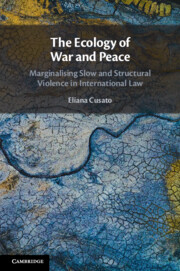Book contents
- The Ecology of War and Peace
- The Ecology of War and Peace
- Copyright page
- Contents
- Acknowledgements
- 1 Introduction
- Part I Concepts, Theories, and Debates
- Part II The Practice of International Law
- 4 War Crimes Tribunals and the International Court of Justice: Nature between Property Protection and Humanitarian Concerns
- 5 The United Nations Security Council
- 6 Truth Commissions
- 7 Conclusion
- Bibliography
- Index
6 - Truth Commissions
Conflicts over Extractive Resources and the Battle for Different Views of Nature
from Part II - The Practice of International Law
Published online by Cambridge University Press: 03 September 2021
- The Ecology of War and Peace
- The Ecology of War and Peace
- Copyright page
- Contents
- Acknowledgements
- 1 Introduction
- Part I Concepts, Theories, and Debates
- Part II The Practice of International Law
- 4 War Crimes Tribunals and the International Court of Justice: Nature between Property Protection and Humanitarian Concerns
- 5 The United Nations Security Council
- 6 Truth Commissions
- 7 Conclusion
- Bibliography
- Index
Summary
Chapter 6 illustrates how ‘truth-seeking’ bodies, the TCs in Sierra Leone, Liberia, and Timor-Leste, selected and reconstructed the facts of resource-driven wars, particularly their underlying causes and dynamics, as well as the responsibility for harms caused by extractive activities. The chapter also shows how different legal regimes were mobilised in support of the ‘truth’ produced by the three institutions, by identifying three paradigms of responsibility: the state-centered perspective of the Sierra Leonean TC, with its focus on local mismanagement and the need to reform resource governance; the economic crimes lens of the Liberian TC, which sought to hold business actors/public officials accountable for resource plunder and related atrocities through prosecution and vetting; and the socio-economic rights approach of the Timor-Leste TC, resulting in the recognition of breaches to the collective rights of the Timorese people to self-determination and recommendation of ecological restoration. Each paradigm captures and misses something about these conflicts and is associated with different reactions by relevant stakeholders to the findings/recommendations of the three TCs.
Keywords
- Type
- Chapter
- Information
- The Ecology of War and PeaceMarginalising Slow and Structural Violence in International Law, pp. 197 - 230Publisher: Cambridge University PressPrint publication year: 2021

